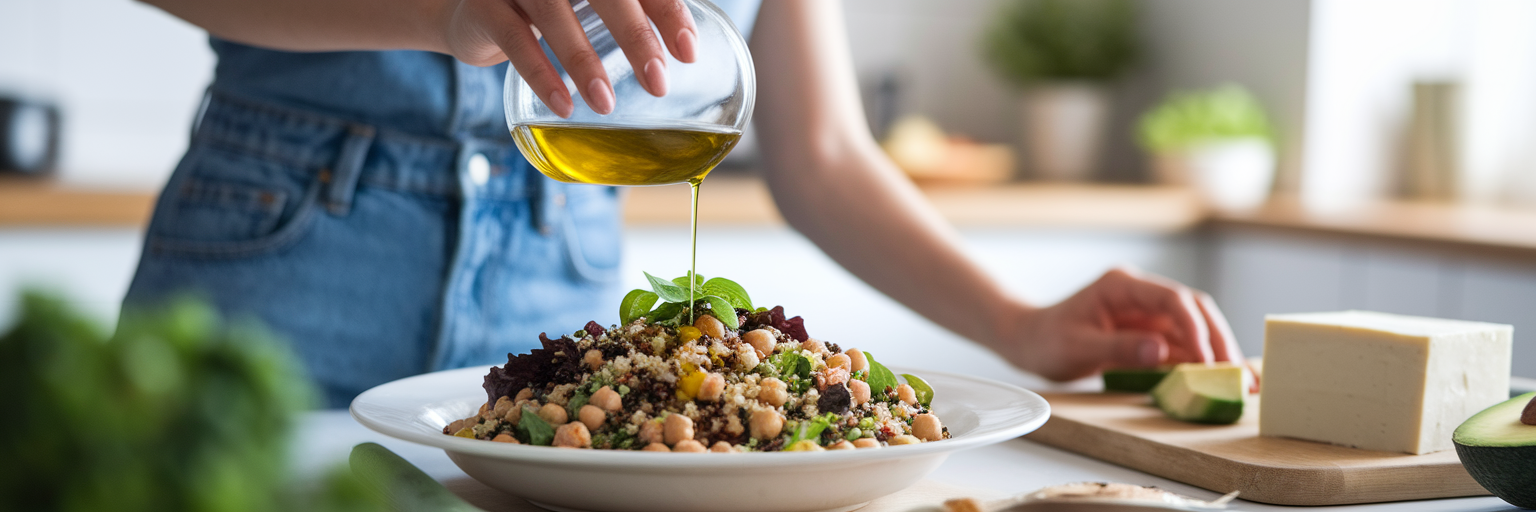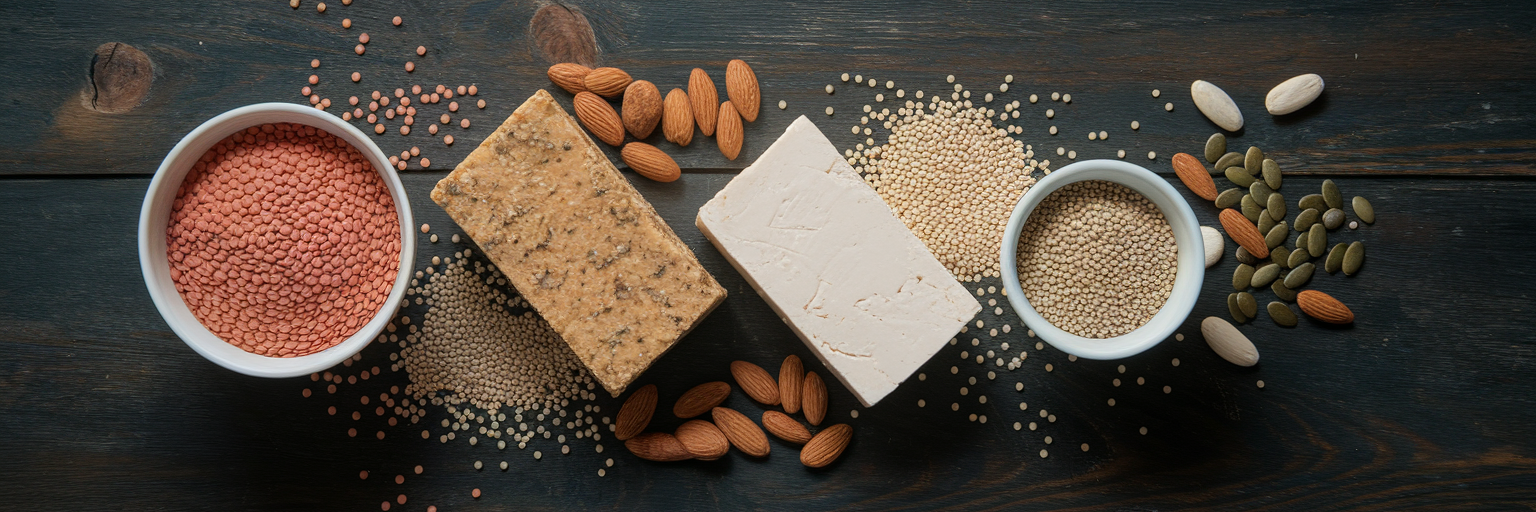Foundations of Plant-Based Muscle Building
The idea that building serious muscle on a vegan diet is a monumental challenge is an outdated myth. With the right knowledge, it's not only possible but straightforward. Success in fitness, regardless of dietary preference, comes down to understanding the three core macronutrients: protein, carbohydrates, and fats. These are the universal building blocks for any body composition goal.
Mastering them requires a strategic nutritional approach tailored to your specific objective. For most fitness journeys, this involves cycling between two primary phases. The first is bulking, where you consume a caloric surplus to build new muscle mass. The second is cutting, which involves a caloric deficit to reduce body fat and reveal the muscle you've worked hard to build. Understanding this distinction is the first step toward structuring your nutrition for powerful results.
The Role of Each Macronutrient in Your Fitness Journey

With that foundational knowledge, let's look at what each macronutrient actually does for your muscles. It's not just about hitting calorie targets; it's about providing your body with the right tools for growth and recovery. Proper balancing of macros on a vegan diet ensures every meal serves a purpose.
Protein is fundamental for muscle protein synthesis. When you train, you create microscopic tears in your muscle fibres. Protein provides the amino acids necessary to repair this damage and build the fibres back stronger and larger. Without adequate protein, your recovery will stall, and your efforts in the gym won't translate to visible gains.
Carbohydrates are your body's primary fuel source. They are stored in your muscles as glycogen and are essential for powering through intense workouts. Consuming enough carbohydrates prevents your body from turning to protein for energy, a process that would otherwise compromise muscle tissue. Think of carbs as the energy that protects your muscle.
Finally, healthy fats play a critical role in hormone production, including hormones like testosterone that are vital for muscle growth. They also aid in the absorption of essential fat-soluble vitamins, supporting overall health and ensuring your body's systems are functioning optimally for recovery.
- Protein: The essential building block for repairing muscle fibres torn during exercise and synthesising new muscle tissue.
- Carbohydrates: The primary energy source that fuels high-intensity training and prevents the body from using protein for energy.
- Healthy Fats: Crucial for regulating hormone production and absorbing fat-soluble vitamins, supporting overall health and recovery.
Optimising Macros for a Vegan Bulking Phase
When your goal is to gain muscle mass, you need to be in a consistent caloric surplus. This is the core principle of a bulking phase. However, simply eating more is not enough; the composition of those calories is what drives quality muscle gain instead of just fat accumulation. For effective vegan protein for bulking, precision is key.
According to research in the International Journal of Sports Nutrition and Exercise Metabolism, consuming 1.6 to 2.2 grams of protein per kilogram of body weight is optimal for maximising muscle hypertrophy. This high intake ensures your body has a constant supply of amino acids for repair and growth. Carbohydrates should make up the bulk of your calories, around 50% to 60%, to fuel demanding workouts and replenish glycogen stores. The remaining 20% to 30% of your calories should come from healthy fats to support hormone function.
A meal that fits this profile could be a large bowl of lentil curry served with a generous portion of brown rice and a side of avocado. This combination delivers high-quality protein, complex carbohydrates for sustained energy, and healthy fats, creating the perfect anabolic environment for growth.
| Factor | Vegan Bulking Phase | Vegan Cutting Phase |
|---|---|---|
| Primary Goal | Maximise muscle mass gain | Maximise fat loss, preserve muscle |
| Caloric Intake | Surplus (300-500 kcal above maintenance) | Deficit (300-500 kcal below maintenance) |
| Protein (per kg of body weight) | 1.6 - 2.2 grams | 2.2 - 2.4 grams |
| Carbohydrates (% of total calories) | ~50% - 60% | ~30% - 40% |
| Fats (% of total calories) | ~20% - 30% | ~30% - 40% |
Note: These ratios are evidence-based starting points. Individual needs may vary based on metabolism, training intensity, and personal response. Adjust as needed to align with your progress.
Adjusting Macros for a Vegan Cutting Phase
After a successful bulking phase, the focus shifts to fat loss while preserving the muscle you've built. This requires a caloric deficit and a strategic adjustment of your macronutrient ratios. A well-structured vegan cutting meal plan is designed to help you feel full and energised while your body sheds fat.
During a cut, protein becomes even more critical. In fact, studies from the Journal of the International Society of Sports Nutrition show that a higher protein intake of 2.2 to 2.4 grams per kilogram of body weight helps prevent muscle breakdown and increases satiety, making it easier to stick to a lower-calorie diet. Carbohydrates are strategically reduced to around 30% to 40% of total calories. This encourages your body to tap into stored fat for energy. It is important to choose complex, high-fibre carbs like leafy greens, broccoli, and beans to manage hunger and maintain stable energy levels.
Fats will typically make up the remainder of your calories, around 30% to 40%. A perfect cutting meal might be a large salad with mixed greens, colourful vegetables, and grilled seitan, topped with a tahini-based dressing. This allows you to create a high-protein, lower-carb meal that is both voluminous and satisfying, keeping hunger at bay while you work towards your fat loss goals.
Powerhouse Plant-Based Protein Sources

Achieving your daily protein targets on a vegan diet is simple when you know which foods to prioritise. A diverse intake not only keeps meals interesting but also ensures you get a complete range of amino acids, which is essential for optimal plant based muscle gain. Focus on incorporating a variety of these whole-food sources into your daily routine:
- Legumes: Lentils, chickpeas, black beans.
- Soy Products: Tofu, tempeh, edamame.
- Grains and Seeds: Quinoa, hemp seeds, chia seeds.
- Meat Alternatives: Seitan (high in protein, made from wheat gluten).
While whole foods should always be the foundation of your diet, hitting high protein targets consistently can be challenging, especially with a busy schedule. This is where supplementation becomes a practical tool. A high-quality vegan protein powder offers a convenient way to boost your intake, particularly after a workout when your muscles are primed for nutrient absorption. Our formula is designed to provide 25 grams of complete protein per serving with a smooth, non-chalky texture, making it an easy and enjoyable way to support your recovery and growth.
Avoiding Common Vegan Nutrition Pitfalls
A successful fitness journey is as much about avoiding mistakes as it is about doing the right things. Many people new to plant-based eating fall into a few common traps that can hinder their progress. The first is the "dirty bulk" pitfall, where calories are sourced from processed vegan junk food. While these foods may help you reach a caloric surplus, they lack the micronutrients essential for recovery and overall health.
Another area to watch is potential nutrient gaps. Athletes, in particular, have higher needs for certain micronutrients like Vitamin B12, iron, and zinc. It is wise to include fortified foods in your diet or speak with a healthcare professional about considering supplementation to ensure all your bases are covered. Finally, pay attention to protein timing. Instead of consuming most of your protein in one or two large meals, distribute your intake throughout the day. This helps maintain a steady state of muscle protein synthesis, supporting continuous repair and growth. By following this complete vegan macronutrient guide, you will have all the tools you need to learn how to build muscle vegan style, effectively and sustainably.



